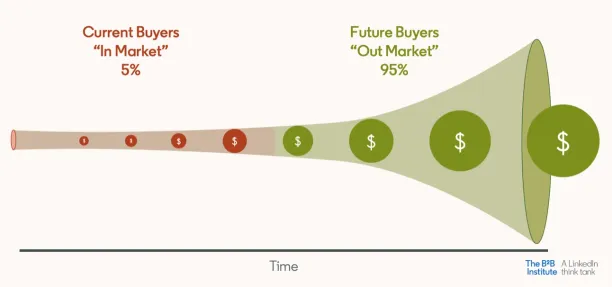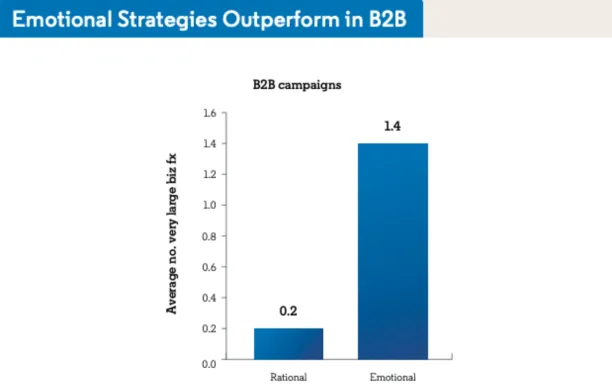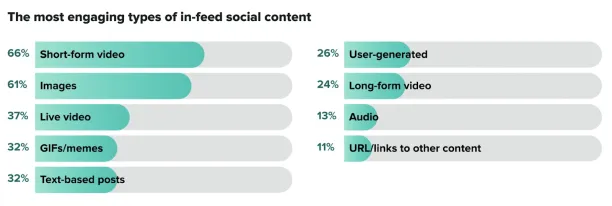B2B Brand Awareness Tactics in 2024
According to the 95-5 rule, at any given time, only 5% of B2B buyers are in-market.1 This means that leveraging long-term marketing strategies to influence future buyers (i.e. 95% of potential buyers) in the upper-funnel is a must (Figure 1).
Figure 1. Presence of in-market and out-market potential buyers through the sales funnel

Source: LinkedIn Ads Blog
To achieve this, a company needs to implement brand awareness efforts to keep the brand name top of mind for future buyers. In this article, we help you by explaining what B2B brand awareness is, why it is important to companies, and by offering tactics for a successful marketing campaign to create awareness for your brand.
What is B2B brand awareness?
B2B brand awareness refers to the extent to which businesses within a specific industry or market are familiar with and recognize the brand, products, or services of another business.
The concept is similar to B2C brand awareness, but it specifically focuses on the relationships and interactions between businesses, rather than between businesses and individual consumers.
Building brand awareness campaigns is crucial for businesses that offer products or services to other businesses, as a strong brand presence can lead to increased trust, credibility, and ultimately, more business opportunities.
What are the factors contributing to B2B brand awareness?
Brand identity
Sincerity and authenticity
According to Forbes, the most important factor for customers in selecting a company is its authenticity.2 To be authentic means you need to be trustworthy and transparent. This is possible only by connecting with customers through emotional influence, rather than relying merely on rational arguments.
In fact, LinkedIn’s B2B Institute found out that creating brand awareness through emotional strategies outperforms doing it through rational strategies by 7 times (Figure 2). Therefore, building your brand awareness around emotional strategies that target sincerity and authenticity is an important factor.
Figure 2. The impact of emotional strategies vs rational strategies on brand messaging to customers

Source: LinkedIn Ads Blog
Brand consistency
Maintaining a consistent brand perception across all marketing channels, including websites, social media, marketing materials, and trade shows, helps businesses build a strong brand image that is easily recognized by other businesses.
Marketing efforts
Analyst relations
Analysts can help brands leverage trusted 3rd parties to increase their brand recognition. For more, you can check our article on how to achieve analyst relations.
Content marketing
Creating and sharing valuable, relevant, and informative content targeted at other businesses can help a company to have industry thought leadership and increase brand recognition.
Check our article to learn more about content marketing challenges and how to overcome them.
Customer testimonials and case studies
Showcasing the positive experiences of existing clients can help demonstrate the value of a company’s products or services to potential B2B customers, increasing brand awareness and trust.
Networking
Building relationships with other businesses through networking events, industry associations, or online forums can help companies increase their brand visibility and credibility within their target market.
Public relations
Engaging in public relations activities, such as publishing press releases, securing media coverage, or participating in industry events, can help raise a company’s profile and boost its visibility within the B2B space.
Social media marketing
Leveraging social media platforms to connect with other businesses and share relevant content can help businesses increase brand awareness and foster relationships with potential partners or clients.
Why is brand awareness important to B2B companies?
Brand awareness offers several significant benefits for B2B companies, which can ultimately contribute to their overall success and growth. Some of the key benefits include:
Attracting talent
A well-known and respected brand is more likely to attract top talent in the industry, as potential employees will be drawn to the company’s reputation and the opportunities it offers for professional growth.
Competitive advantage
Higher brand awareness can set a B2B company apart from its competitors, making it more likely that businesses will choose to work with them. A strong brand can act as a differentiator in a crowded market, helping the company capture a larger share of the market.
Easier customer acquisition
When a B2B brand is well-known, potential customers are more likely to consider it when looking for a product or service within that industry. This can lead to a higher conversion rate for lead generation and a shorter sales cycle and buyer’s journey, as less time is spent on convincing potential buyers of the company’s credibility.
Higher customer retention
A recognizable and trusted brand is more likely to retain existing clients, as they will have a positive association with the company and its offerings. Customer retention is vital for B2B businesses, as retaining clients is often more cost-effective than acquiring new ones.
Improved brand equity
A strong brand awareness can lead to increased brand equity, which is the perceived value of a brand based on its reputation, recognition, and associations. Higher brand equity can result in:
- Increased customer loyalty
- Willingness to pay a premium for products or services
- Stronger overall market position.
Increased trust and credibility
A well-known brand often carries a perception of trustworthiness and reliability. When businesses recognize a brand, they are more likely to trust its products or services, making it easier for the company to establish and maintain long-term relationships with clients.
Increased marketing effectiveness
B2B companies with high brand awareness can often achieve better results from their marketing strategy, as their target audience is already familiar with their brand. This can lead to higher engagement rates, more qualified leads, and ultimately, a better return on investment for marketing activities.
What are the best practices for building brand awareness?
1- Define your brand identity
Before you start building brand awareness, it’s essential to define your brand identity, which includes your brand’s mission, values, personality, and unique selling proposition (USP). This foundation will guide your messaging and visual identity, ensuring consistency across all channels.
2- Develop a strong visual identity
Create a cohesive and memorable visual identity, including a logo, color palette, typography, and other design elements. Consistency in visual identity across all marketing materials, online presence, and product packaging can help your brand become easily recognizable.
This can be achieved by spending millions on the brand logo or by spending none. For example, while Pepsi spent 1 million dollars for its brand logo, Twitter only spent 15 dollars.3 The important thing is to have a visual representation that is catchy and memorable.
Figure 3. Pepsi logo & Twitter logo


3- Create valuable content
Develop high-quality, relevant, and informative content that targets your audience’s needs and preferences. Content marketing can position your brand as a thought leader in your industry, foster trust, and increase brand visibility.
4- Leverage social media
Use social media platforms to engage with your target audience, share valuable content, and showcase your brand’s personality. Choose platforms that align with your target demographic and develop a consistent posting schedule to maintain engagement.
5- Engage in public relations
Build relationships with media outlets and industry influencers to secure coverage and increase your brand’s visibility. Press releases, guest articles, interviews, and participation in industry events can all help boost your brand awareness.
6- Utilize Search Engine Optimization (SEO)
Optimize your website and content for search engines to improve your online visibility and attract organic traffic by increasing the number of your website visitors. Conduct keyword research, optimize on-page elements, and focus on building high-quality backlinks to increase your search rankings.
7- Invest in advertising
Use online and offline advertising channels to promote your brand and reach a larger audience. Consider Google Ads, social media advertising, print ads, or outdoor advertising, depending on your target audience and budget.
8- Implement co-branding and collaborations
Partner with complementary brands or businesses to create co-branded products, services, or marketing campaigns. Such collaborations can help both brands expand their reach and grow brand awareness.
9- Launch a podcast or video series
Create a podcast or video series on topics relevant to your industry and target audience. Buyers favor short-form video more than any other type of content (see Figure 4). Regularly sharing valuable insights can help build brand awareness and position your brand as a thought leader.
Figure 4. Consumer’s content preferences

Source: Sprout Social
If you need help, we can help:
External Links
- 1. “95-5 Rule | LinkedIn Marketing Solutions.” Business LinkedIn, https://business.linkedin.com/marketing-solutions/b2b-institute/b2b-research/trends/95-5-rule?trk=lms-blog-b2b&src=bl-po. Accessed 3 April 2023.
- 2. “Why authenticity is now the most important asset a company can possess.” Forbes, https://www.forbes.com/sites/forbesbusinesscouncil/2022/05/04/why-authenticity-is-now-the-most-important-asset-a-company-can-possess/?sh=480f7d5c35da. Accessed 3 April 2023.
- 3. “Here’s How Much Money The World’s Biggest Brands Spent Designing Their Logos.” Business Insider, 14 August 2012, https://www.businessinsider.com/heres-how-much-money-the-worlds-biggest-brands-spent-designing-their-logos-2012-8#twitter-15-3. Accessed 3 April 2023.

Cem has been the principal analyst at AIMultiple since 2017. AIMultiple informs hundreds of thousands of businesses (as per similarWeb) including 60% of Fortune 500 every month.
Cem's work has been cited by leading global publications including Business Insider, Forbes, Washington Post, global firms like Deloitte, HPE, NGOs like World Economic Forum and supranational organizations like European Commission. You can see more reputable companies and media that referenced AIMultiple.
Throughout his career, Cem served as a tech consultant, tech buyer and tech entrepreneur. He advised businesses on their enterprise software, automation, cloud, AI / ML and other technology related decisions at McKinsey & Company and Altman Solon for more than a decade. He also published a McKinsey report on digitalization.
He led technology strategy and procurement of a telco while reporting to the CEO. He has also led commercial growth of deep tech company Hypatos that reached a 7 digit annual recurring revenue and a 9 digit valuation from 0 within 2 years. Cem's work in Hypatos was covered by leading technology publications like TechCrunch and Business Insider.
Cem regularly speaks at international technology conferences. He graduated from Bogazici University as a computer engineer and holds an MBA from Columbia Business School.
To stay up-to-date on B2B tech & accelerate your enterprise:
Follow on
Comments
Your email address will not be published. All fields are required.